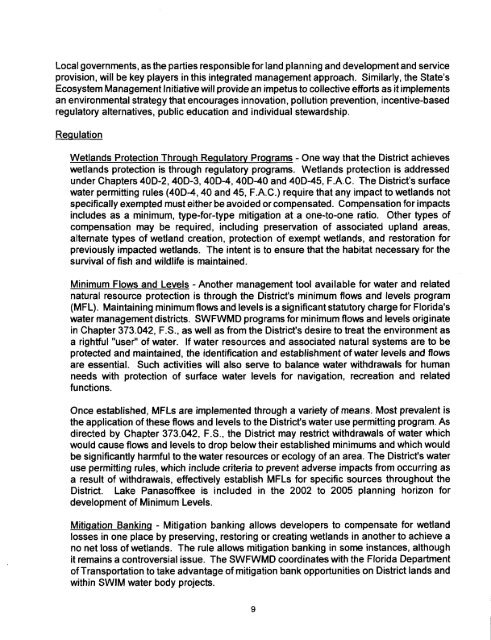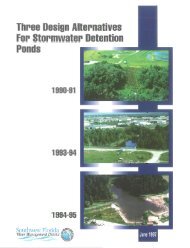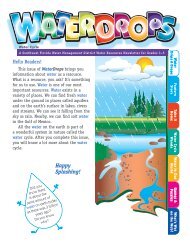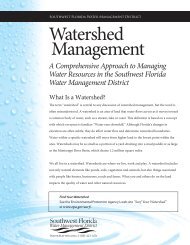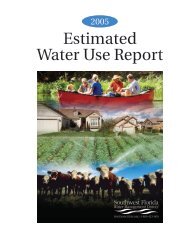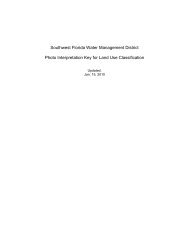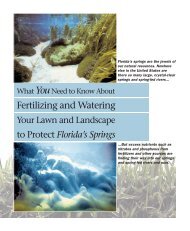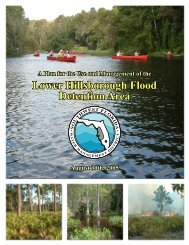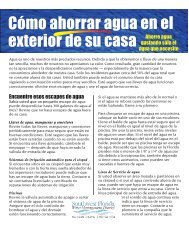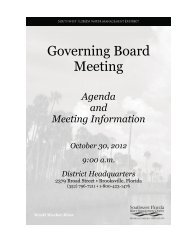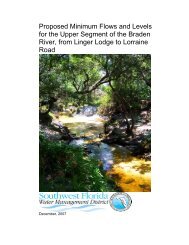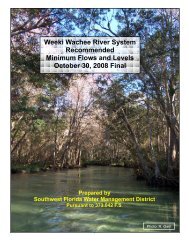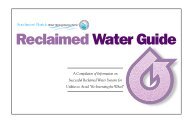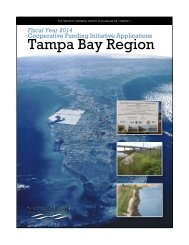Lake Panasoffkee SWIM Plan - Southwest Florida Water ...
Lake Panasoffkee SWIM Plan - Southwest Florida Water ...
Lake Panasoffkee SWIM Plan - Southwest Florida Water ...
Create successful ePaper yourself
Turn your PDF publications into a flip-book with our unique Google optimized e-Paper software.
Local governments, as the parties responsible for land planning and development and service<br />
provision, will be key players in this integrated management approach. Similarly, the State's<br />
Ecosystem Management Initiative will provide an impetus to collective efforts as it implements<br />
an environmental strategy that encourages innovation, pollution prevention, incentive-based<br />
regulatory alternatives, public education and individual stewardship.<br />
Reclulation<br />
Wetlands Protection Throuqh Regulatory Proqrams - One way that the District achieves<br />
wetlands protection is through regulatory programs. Wetlands protection is addressed<br />
under Chapters 40D-2,40D-3,40D-4,40D-40 and 40D-45, F.A.C. The District's surface<br />
water permitting rules (40D-4,40 and 45, F.A.C.) require that any impact to wetlands not<br />
specifically exempted must either be avoided or compensated. Compensation for impacts<br />
includes as a minimum, type-for-type mitigation at a one-to-one ratio. Other types of<br />
compensation may be required, including preservation of associated upland areas,<br />
alternate types of wetland creation, protection of exempt wetlands, and restoration for<br />
previously impacted wetlands. The intent is to ensure that the habitat necessary for the<br />
survival of fish and wildlife is maintained.<br />
Minimum Flows and Levels - Another management tool available for water and related<br />
natural resource protection is through the District's minimum flows and levels program<br />
(MFL). Maintaining minimum flows and levels is a significant statutory charge for <strong>Florida</strong>'s<br />
water management districts. SWFWMD programs for minimum flows and levels originate<br />
in Chapter 373.042, F.S., as well as from the District's desire to treat the environment as<br />
a rightful "user" of water. If water resources and associated natural systems are to be<br />
protected and maintained, the identification and establishment of water levels and flows<br />
are essential. Such activities will also serve to balance water withdrawals for human<br />
needs with protection of surface water levels for navigation, recreation and related<br />
functions.<br />
Once established, MFLs are implemented through a variety of means. Most prevalent is<br />
the application of these flows and levels to the District's water use permitting program. As<br />
directed by Chapter 373.042, F.S., the District may restrict withdrawals of water which<br />
would cause flows and levels to drop below their established minimums and which would<br />
be significantly harmful to the water resources or ecology of an area. The District's water<br />
use permitting rules, which include criteria to prevent adverse impacts from occurring as<br />
a result of withdrawals, effectively establish MFLs for specific sources throughout the<br />
District. <strong>Lake</strong> <strong>Panasoffkee</strong> is included in the 2002 to 2005 planning horizon for<br />
development of Minimum Levels.<br />
Miticlation Bankinq - Mitigation banking allows developers to compensate for wetland<br />
losses in one place by preserving, restoring or creating wetlands in another to achieve a<br />
no net loss of wetlands. The rule allows mitigation banking in some instances, although<br />
it remains a controversial issue. The SWFWMD coordinates with the <strong>Florida</strong> Department<br />
of Transportation to take advantage of mitigation bank opportunities on District lands and<br />
within <strong>SWIM</strong> water body projects.<br />
9


